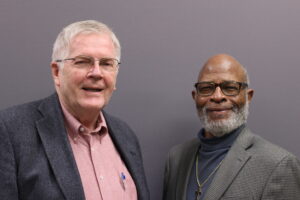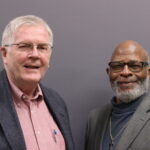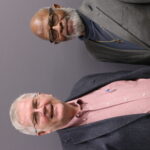Description
Friends Norman Hatter (79) and Steven McCutchan (80) discuss meeting civil rights leaders Martin Luther King Jr., and Stokely Carmichael. They talk about guiding their churches through racism and racial equity as they both have served different types of Christian congregations. They conclude with a discussion about God, a person's relationship with God and other cultures, nature and the wholeness that comes about because of it.Subject Log / Time Code
Norman (N) talks with Steven (S) about Martin Luther King Jr's (MLK) birthday and about being retired Presbyterian Ministers. Norman describes himself as black and describes Steven as white and that they have been doing work on racial equity.
N talks about meeting Martin Luther King Jr. while a freshman at the University of Michigan in 1965. He reads an excerpt of a powerpoint presentation about this meeting.
paused then started over.
(N) asks Steven (S) how did he get started in the work of race relations. S states that he had never met MLK personally but was present at Riverside Church during his famous sermon against the Vietnam War and was encouraged by MLK's courage.
S mentions that the person who really changed his direction was Stokely Carmichael when he met him at his seminary. This is where Stokely Carmichael spoke to the white caucasian males about focusing their attention on the suburbs where there is power for change and S quotes Carmichael saying I don't want you to come down to the ghetto to get rid of your guilt off of my back.
S asks N when did he realize his skin color mattered. N responds from a young age living in Flint, Michigan realized white or light was seen as better. S added that he didn't realize growing up on a farm. He didn't notice race until junior high school when he had to go with a fellow teammate who was black into a back room.
N discusses during the time of the week of protests in Montgomery, Alabama that he knew his work against racism would be from the inside so he focused on his academics. He became disenchanted with the corporate world so he decided to become a minister. He then realized that those who proclaim the principles of Christianity are not as he describes walking the talk.
N asks S about how did his congregation respond to walking the talk of Christianity as it pertained to race and S explains that he was met with resistance and references MLK's famous Letter from a Birmingham Jail to a white minister.
S talks about his congregation wanting to change and wanting to know of ways to make a difference. Then he discusses racial tensions while a minister in Winston-Salem, NC. He met with black ministers to have an interracial dialogue. This is when S realized that black communities are use to people talking and not putting change into action. They ended up working with the police review board and education system.
S discusses people of different races going home to relax where black people go to black churches and white people go to white churches, living separate lives. Their group decided to create interracial social events to learn more about each other. S then mentions asking his congregation what does it mean to really love your neighbor.
N asks S if there were times where the push back was overwhelming if S would ever want to go back to a comfortable life. S responds with a memory of his father dying when he was a young boy and that he felt that there was something bigger.
N & S discuss how technology has contributed to being able to have church during Covid and that they both noticed that people are more relaxed, and are willing to share and be more open.
N states that humans need to be in relationship. He is intrigued by S's belief that God's relationship with people also includes animals and inanimate objects. S speaks of God as love and that it is a relationship with all of creation. If a person is not allowing another person in regarding race relations then they are not experiencing the fullness of God.
N discusses white privilege in the corporate world and a memory of explaining to a fellow co-worker why they needed a mentorship program. N uses an example of a country club to explain access to this co-worker.
S asks N about N's experience of racism at a young age. N responds that he wasn't able to receive work promotions and talks of being spat on.
N talks of daughter mentioning that he was lucky to meet MLK and that things are better. N adds that he didn't want to burst her bubble but that he sees things now that he saw 40 years ago. S also states that he read a quote that said that racism doesn't go away it just adapts.
N & S talk about their hope in the next 10 years. They discuss spheres of influence. N talks about Christians who often pray and adds that God gave people the ability to act and that there is an expectation to love your neighbor in action.
Participants
- Norman Hatter
- Steve McCutchan


